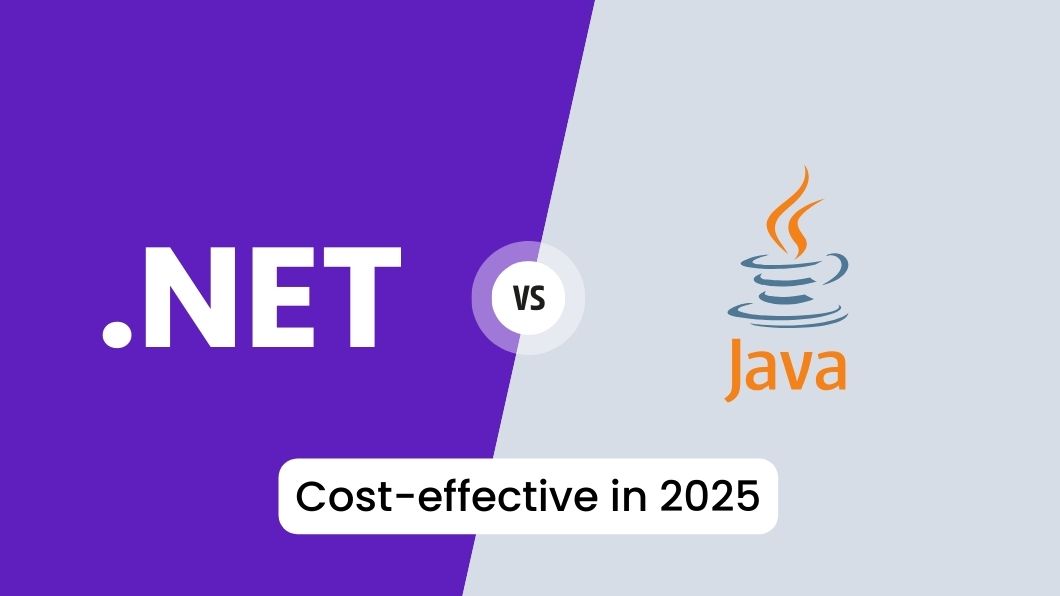Table of Contents
.NET vs. Java: Which is More Cost-Effective for Your 2025 Projects?
In the ever-evolving world of software development, choosing the right technology stack is critical to project success. Among the most debated choices are .NET and Java—two leading frameworks that have dominated the industry for decades. As businesses gear up for 2025, understanding which platform offers better cost-effectiveness is essential for planning and execution.
This blog explores the .NET vs Java debate in-depth, focusing on their cost implications, scalability, and suitability for modern projects. With the SEO keyword “.NET vs Java cost-effective in 2025” in focus, we aim to guide businesses in making informed decisions for their next software development project.
Understanding .NET and Java
What is .NET?
.NET is a framework developed by Microsoft that enables developers to build web, mobile, desktop, and IoT applications. With the introduction of .NET Core, it has become a cross-platform solution supporting Windows, macOS, and Linux.
What is Java?
Java is a versatile, platform-independent programming language and runtime environment. Known for its “write once, run anywhere” philosophy, Java powers applications across a wide range of domains, from web and mobile apps to enterprise-grade solutions.
Key Factors Influencing Cost-Effectiveness
1. Development Costs
- .NET:
.NET developers often use Microsoft tools like Visual Studio, which are feature-rich but may require licensing fees. However, open-source alternatives like .NET Core reduce costs significantly.- Advantages:
- Comprehensive development ecosystem.
- Enhanced productivity due to integrated tools.
- Advantages:
- Java:
Java has a vast pool of free tools and frameworks such as Eclipse and IntelliJ IDEA (Community Edition). These tools lower the barrier to entry, especially for startups.- Advantages:
- Open-source nature reduces upfront costs.
- Mature ecosystem with a wide range of libraries.
- Advantages:
Winner: Java offers lower development costs for startups and small businesses, while .NET provides value for enterprise-scale projects.
2. Licensing and Maintenance Costs
- .NET:
While .NET Core is open-source, some enterprise tools and features in the .NET ecosystem may have associated licensing fees. Maintenance costs are manageable due to Microsoft’s robust support ecosystem. - Java:
Java is free to use, but Oracle’s licensing policies for JDK in enterprise environments can introduce additional costs. OpenJDK offers a free alternative, but support may not be as robust as Oracle’s paid offerings.
Winner: .NET has an edge in maintenance due to comprehensive enterprise support, while Java is more cost-effective for smaller projects.
3. Talent Availability and Developer Costs
- .NET:
The availability of skilled .NET developers is high, but their average salary is often higher compared to Java developers due to the demand for enterprise-grade expertise. - Java:
Java developers are more abundant globally, and their services are generally more affordable. Java’s long-standing popularity in educational institutions ensures a steady talent pipeline.
Winner: Java wins in terms of cost-efficiency for developer hiring, especially for smaller budgets.
4. Scalability and Performance
- .NET:
With features like Just-In-Time (JIT) compilation and seamless integration with Azure, .NET provides exceptional scalability and performance for cloud-based applications. - Java:
Java is known for its scalability and robustness. It powers some of the largest enterprise systems worldwide. Its JVM (Java Virtual Machine) ensures consistent performance across platforms.
Winner: Tied—both platforms excel in scalability and performance, depending on the project requirements.
5. Security and Compliance
- .NET:
Microsoft offers built-in security features like code access security and validation. For enterprises in regulated industries, .NET’s compliance capabilities are robust. - Java:
Java’s security features are strong, with tools for authentication, encryption, and secure communication. Open-source tools may, however, require additional configuration for enterprise compliance.
Winner: .NET offers a slight edge for compliance-heavy industries.
Use Cases and Industry Suitability
.NET:
- Ideal for enterprise-level applications, SaaS platforms, and industries requiring strict compliance (e.g., finance, healthcare).
- Best for projects leveraging Microsoft technologies like Azure and Office 365.
Java:
- Perfect for large-scale enterprise systems, mobile app development, and cross-platform solutions.
- Widely used in industries like eCommerce, telecom, and banking.
Cost Analysis of .NET vs Java in 2025
| Factor | .NET | Java |
|---|---|---|
| Development Costs | Higher upfront for tools | Lower due to open-source tools |
| Licensing Fees | Moderate for enterprise use | Free or low with OpenJDK |
| Talent Costs | Higher due to specialized skills | Lower due to abundant developers |
| Maintenance Costs | Lower with Microsoft support | Variable depending on the JDK choice |
| Scalability and Performance | Excellent with Azure integration | Robust with JVM |
How to Choose Between .NET and Java in 2025
1. Consider Your Project Scale
- Small to Medium Projects: Java’s open-source nature and cost-effective tools are advantageous.
- Large Enterprise Projects: .NET’s robust ecosystem and enterprise support are ideal.
2. Evaluate Long-Term Costs
- Assess licensing, developer salaries, and maintenance over the project’s lifecycle.
3. Factor in Existing Infrastructure
- Businesses already using Microsoft tools may find .NET more cost-effective.
4. Prioritize Scalability and Security
- Both platforms excel in scalability, but .NET may offer better security features for regulated industries.
Why Zenkins is Your Ideal Partner for .NET and Java Projects
At Zenkins, we bring expertise in both .NET and Java to deliver tailored solutions that align with your business goals. Whether you’re looking to build an enterprise-grade application or a cost-effective MVP, we provide:
- Comprehensive Consultation: Assessing your project needs to recommend the best technology.
- End-to-End Development: From ideation to deployment, we ensure seamless execution.
- Scalable Solutions: Building systems that grow with your business.
- Cost Optimization: Leveraging tools and strategies to maximize ROI.
Conclusion
Choosing between .NET and Java for your 2025 projects depends on factors like project scale, budget, and long-term goals. While Java may seem more cost-effective for startups and smaller projects, .NET’s enterprise-grade features and support make it a strong contender for larger, compliance-heavy applications.
With Zenkins as your development partner, you can rest assured that your choice will be aligned with your business objectives and budget. Contact us today to discuss your next project and discover how we can help you achieve your goals.




